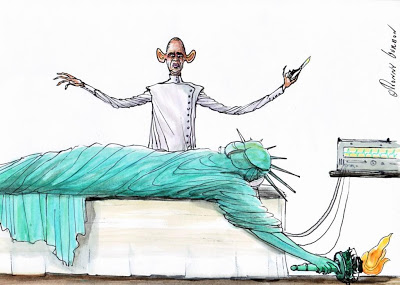
Book available at Amazon
Our readers well understand the crucial importance of stopping any further Obama court nominations. No deference is owed under the Constitution, period. Justice Scalia’s death is also a cataclysmic political event. Disallowing the replacement of Justice Scalia with anyone Obama would come up with is critical to hope for the future of our constitutional republic.
Precedence you ask . . . From the Daily Signal (Heritage Foundation) – bold our emphasis.
Flashback to 1992: When Democrats Halted a Republican President’s Judicial Nominees
If Senate Democrats get their way, Republicans won’t follow their example. That is, Senate Republicans in 2016 won’t act like Democrats did when they blocked court confirmations in 1992.
Twenty-four years ago looked a lot like the inverse of today. On the eve of a presidential election, there was a Republican in the White House and a Democrat majority in the Senate.
Now those roles are reversed—and so is the Democrat perspective on judicial nominees.
Rather than confirming President George H.W. Bush’s picks for federal judgeships, The New York Times from Sept. 1, 1992 reports, Senate Democrats delayed nominees “to preserve the vacancies for [Arkansas] Gov. Bill Clinton to fill if he is elected president.”
The Daily Signal is the multimedia news organization of The Heritage Foundation. We’ll respect your inbox and keep you informed.
In an era before widespread use of the Internet, “none of the senators urging a shutdown” for Bush nominees would go on the record or register their opinion publicly with The New York Times.
But Neil Lewis reported that Senate Democrats wanted to leave approximately 50 judgeships open for “presumably more liberal nominees.”
According to Senate roll call votes from 1992, only one Bush judicial nominee received a vote after The New York Times published that story.
Edward Carnes, nominated by Bush in January 1992 and later filibustered by Democrats, won confirmation to the U.S. Court of Appeals for the 11th Circuit on a vote of 62-36 on Sept. 9, 1992. He was the final nominee confirmed under Bush.
Another Bush nominee at the time was John G. Roberts, now chief justice of the Supreme Court. In 1992, the Senate opted not to vote on Roberts’ nomination to the U.S. Court of Appeals for the District of Columbia Circuit. Without Senate action, his nomination was left to expire.
The New York Times reports that in the House, Rep. John Conyers, D-Mich., led a congressional congregation to complain to then-Senate Majority Leader George J. Mitchell, D-Maine.
“We told him it was very unsettling, even incredible, that the Senate should continue to consider these people as if it were business as usual,” Conyers told the newspaper. In the minority today, Senate Democrats have shifted their opinion at news that Republicans intend to leave vacant the seat of Supreme Court Justice Antonin Scalia, a conservative who died Saturday.
Senate Democrats, led by Minority Leader Harry Reid, D-Nev., and Chuck Schumer, D-N.Y., have accused Republicans of a dereliction of their constitutional duty to advise and consent on judicial nominees.
In an op-ed Monday in The Washington Post, Reid criticized Senate Republicans for engaging in “partisan sabotage” after Majority Leader Mitch McConnell, R-Ky., announced he wouldn’t move an Obama nominee to the court.
Reid predicted Republicans would be “remembered as the most nakedly partisan, obstructionist, and irresponsible majority in history.”
Edward Whelan, president of the Washington-based Ethics and Public Policy Center, told The Daily Signal that Democrats have done “the same thing Republicans are doing now.”
A Supreme Court clerk for Scalia in the 1990s, Whelan said he sees this back and forth as par for the course.
“The confirmation process is inherently political,” he said. “Especially when you’re talking about transformational seats, it’s all the more intense.”
Web can be more explicit. Dems stopped ALL controversial Bush judicial nominees in election year 1992 but one, * and that for the 11th circuit, not the most influential circuit and already conservative, no doubt a minor political bargain not considered critical to the Democrats vision for the future. Some have suggested that holding hearings on a nominee serves politically in order to expose their record and not appear “obstructionist.” One could fantastically envision the Republican Senate Judiciary Committee raking a Loretta Lynch or Eric Holder over the coals for their disregard for the Constitution. Regrettably one could more realistically envision hand-wringing, bargaining “bi-partisanship” and capitulation as the end result of moving forward (without Senator Grassley). That they get that far probably does not enhance prospects for Republicans, as voters question their reliability. And then there is Mitch McConnell’s notable resolve.
Isn’t this a great illustration of the overall situation we are in?

* Senator Bob Smith (NH) Congressional Record U.S. Senate March 7, 2000 pages 2131
